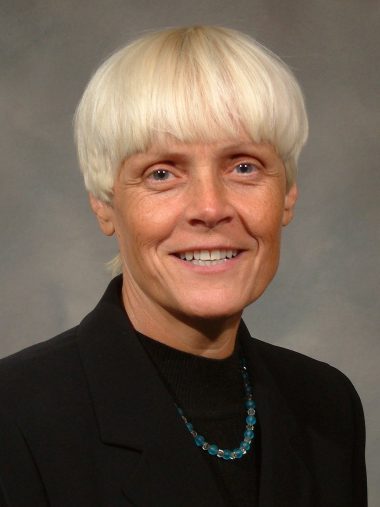Janna Anderson, associate professor in the School of Communications, is a primary contributor to the cover story in the latest issue of NextSpace, the publication of the Online Computer Library Center, a nonprofit computer service and research organization whose systems help libraries locate, acquire, catalog and lend library materials.

NextSpace editors asked Anderson to contribute some ideas for the library of 2020, and they wrapped these and other concepts into a feature titled “ROI 2020.” She said we should remember that libraries are, at their core, collective-intelligence centers. They are not and should not merely be tied to the displaying and lending of books in hard-copy form.
“Librarians should be leaders in crowd-sourcing for problem-solving,” she told them. “They can be conductors who bring individual people and ideas together to create intellectual symphonies. What if every library was also a ‘home’ base for human resources in that community, for the knowledge leaders who could do live-streaming, online presentations that are also recorded for future use and stored on video/wikis that extend that conversation? We can do this today — see the TED talks and other resources now emerging.” (For more on TED talks, visit www.ted.com/talks.)
Anderson added that libraries can be reimagined as collective intelligence centers, building upon a particular specialty, becoming global institutes or think tanks focusing on documenting and expanding upon knowledge of one particular type — keeping in mind that human sources and accurate, timely information is the key. She told NextSpace editor Tom Storey that expert people from all over the globe can work together through a particular library to produce well-edited and constantly updated collective-intelligence works.
“Yes, Wikipedia comes to mind as an example — what if every library in the world had staff assigned to take on the responsibility of curating several particular Wikipedia entries?” Anderson asked.
Anderson offered these additional suggestions for evolving libraries in the digital age:
- Leverage your library beyond the building. It is more than simply a geographic location with shelves of books, DVDs and periodicals. A library is a global knowledge organization, with no walls, shelves or parking spaces required.
- Consider warehousing (nearby and available for next-day checkout) most items in the collection more than three years old that have not been checked out in the past two years — especially if they are available free online. Be ready for the day when you literally have no hard copies of any items — everything is available digitally.
- Extend your outreach. Consider making new staff hires based on the fact that you need interactive media project coordinators who can use new tools to make sense out of information for the general public.
- Plan to be an information center that specializes in a topic or two in addition to being a central location for accessing general knowledge. Build upon that by collecting information in new ways to share with the global public.
- Reimagine your role. Knowledge is no longer a scarce resource; your constituents need your help to focus on the best ways to access and use knowledge in order to create more knowledge, bring more clarity and solve global and local problems.
The article is featured in volume 17 of NextSpace, which is available in hard copies from OCLC and online at http://www.oclc.org/nextspace/017/1.htm


